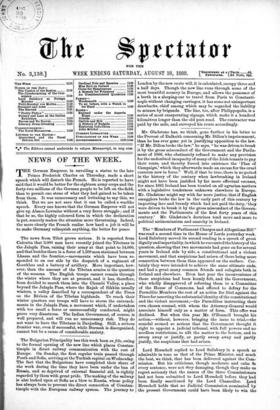The news from Tibet grows serious. It is reported from
Calcutta that 3,000 men have recently joined the Tibetans in the Jalapla Pass, raising their army at that point to 14,000, and that besides there is a force of 1,500 men stationed between Lbassa and the frontier,—movements which have been re- sponded to on our side by the despatch of a regiment of Croorkhas and a battery of artillery. More important, how- ever, than the amount of the Tibetan armies is the question of the seasons. The English troops cannot remain through the winter where they are at present, and it has, therefore, been decided to march them into the Chumbi Valley, a place beyond the Jalapla Pass, where the Rajah of Sikkim usually winters, a valley described by a correspondent of the Times as the Riviera of the Tibetan highlands. To reach their winter quarters our troops will have to storm the entrench- ments in the Jalapla Pass, a movement which, if undertaken with too small a force or unsuccessfully conducted, might prove very disastrous. The Indian Government, of course, is well prepared, and will run no unnecessary risk. They do not want to have the Tibetans in Darjeeling. Still, a serious frontier war, even if successful, while Burmah is disorganised, cannot but be a cause of considerable anxiety.


































